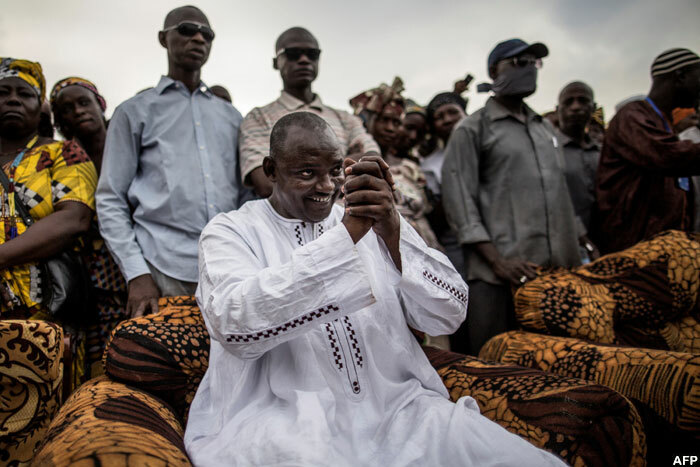Buoyant opposition threatens veteran leader in Gambia vote
Dec 01, 2016
Jammeh is running for a fifth term in office with his ruling Alliance for Patriotic Reorientation and Construction (APRC).

PIC: Incumbent Gambian President Yahya Jammeh listens to one of his aides in Banjul during the closing rally of the electoral campaign of the Alliance for Patriotic Reorientation and Construction (APRC). (AFP)
Gambian President Yahya Jammeh faces the biggest threat to his 22-year rule Thursday as the country heads to the polls following two weeks of unprecedented rallies by an energised opposition.
Some 880,000 Gambians will be eligible to vote when more than 1,400 polling stations open at 0800 GMT in an election overshadowed by an internet blackout in a nation long accused by rights groups of suppressing freedom of expression.
The winner will serve a five-year term in The Gambia, a tiny former British colony in west Africa which occupies a narrow sliver of land surrounded by French-speaking Senegal.
Jammeh is running for a fifth term in office with his ruling Alliance for Patriotic Reorientation and Construction (APRC).
He faces previously unknown businessman Adama Barrow, chosen as a flagbearer by seven Gambian political parties and an independent candidate who have joined forces for the first time to form a coalition with unprecedented support.
A third candidate, former ruling party MP Mama Kandeh, is also standing for the Gambian Democratic Congress (GDC).
At his final rally on Tuesday night, Jammeh said he was looking forward to ramping up development in a country that "will move faster than it has in 22 years," but he also warned that protests over Thursday's result would not be tolerated.
The Gambia's unique voting system, which sees citizens vote by dropping a marble into a coloured drum for their candidate, could not be rigged, he added, meaning "there is no reason for anybody to protest."
Rights group Amnesty International urged the authorities to ensure that the election and post-electoral period "are held in a climate that is free from violence and which fully respects the right of all people to freely express their views."

Adama Barrow, the flag-bearer of the coalition of the seven opposition political parties in Gambia, greets supporters during a gathering in the buffer Zone district of Talinding
'Tremendous' opposition support
Internet was down from around 8.15 pm (2015 GMT) on the eve of the vote, an AFP journalist said, following warnings of an election day blackout from the US embassy.
Popular private voice and messaging apps such as Whatsapp, Skype and Viber are unreachable without a Virtual Private Network (VPN), software many Gambians use to work around the problem.
The opposition relies on messaging applications and texts to organise mobile rallies that have seen roads blocked repeatedly over the last week around Banjul as demonstrations outgrow planned venues.
"People have shown us tremendous support. With that support we are 100 percent plus that we are going to win and with a big margin," Barrow told AFP on Tuesday, the final day of campaigning.
Barrow was chosen after several leaders with the opposition United Democratic Party (UDC) were jailed in July for holding peaceful protests, one of which was organised to protest the death in custody of a party member.
If Barrow were to win -- a tall order both in terms of votes and the likelihood of Jammeh giving up power -- he would likely serve a three-year term at the head of a transition reform government.
There will be no professional international observers present, diplomats confirmed to AFP Wednesday, but a small team of African Union experts will monitor events along with Banjul-based US and European delegations already present in the country.
Jammeh seized power in a 1994 coup and has targeted opponents and several of his own ministers in recent years, while surviving multiple attempts to remove him from power.
In the months prior to the vote, a former minister, an MP who formerly belonged to the ruling party and two journalists with the state broadcaster have been detained.
Significant progress has been made in the last 20 years in improving literacy and child mortality rates, and the president has in the last year banned child marriage and female genital mutilation.
But 60 percent of the population live in poverty, and a third survive on $1.25 (1.20 euro) or less a day, according to the UN.
Gambians make up the largest group per capita of migrants arriving in Italy after making the perilous crossing by sea from north Africa, figures from the International Organization for Migration show.
